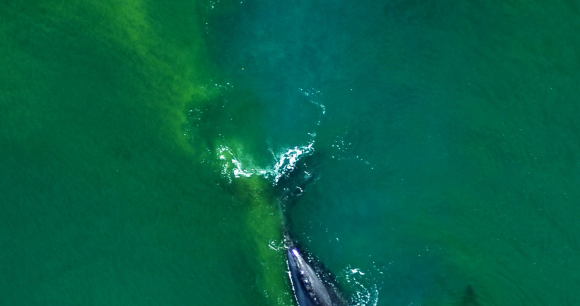
Washington, DC—A new report, released to the public today, reveals the enormous ecological benefits that whales and other cetaceans provide to the environment. The report is the product of a workshop, conducted during the July 2017 International Congress for Conservation Biology, in Cartagena, Colombia, entitled “The Role of Cetaceans in Ecosystem Functioning: Defining Conservation Policies in the 21st Century.”
The report documents how whale feces, rich in iron, nitrogen and other nutrients, trigger phytoplankton blooms that increase the productivity of the entire marine food web and sequester thousands of tons of carbon from the atmosphere annually. Whales’ own massive bodies also lock up carbon. When whales die and sink, their carcasses nourish sea-floor communities.
The report explores how these and other ecological services provided by cetaceans can be integrated into national and international conservation policy, including within the United Nations Framework Convention on Climate Change and the International Whaling Commission (IWC). In 2016, the IWC adopted a groundbreaking resolution recognizing the ecological contributions made by cetaceans to ecosystem functioning. More recently, the IWC established a new Working Group on Cetaceans and Ecosystem Functioning, which will make recommendations on how the IWC can assist studies of this emerging issue and apply those findings to decisions concerning cetacean conservation.
“The IWC’s resolve to examine the ecosystem services of cetaceans demonstrates its evolution,” said Sue Fisher, a marine consultant for the Animal Welfare Institute and one of the workshop panelists. “Transforming from an organization that recently considered the resumption of commercial whaling to one that recognizes the importance of integrating the ecological, economic and social value of live cetaceans into its decision-making, the IWC has made definite progress. We look forward to contributing to this visionary collaboration between governments, researchers and conservation organizations.”
“I’m thrilled to see Chile and other nations promote the important role of whales in the ecology of the oceans,” said Dr. Joe Roman, research associate professor at University of Vermont and global specialist on the subject. “In the 21st century, we should be recognizing the many services that whales provide—including whale watching, the enhancement of productivity, and carbon sequestration—and moving beyond their value on the flensing deck.”
“Historically, oceans were seen as an infinite source of resources and today it has become obvious this is a misconception,” affirmed Barbara Galletti, president of Cetacean Conservation Center of Chile. “Science is showing that cetaceans make significant contributions to the healthy functioning of the marine ecosystem. The advances lead by Chile at the IWC are certainly a cornerstone to strengthen international policies oriented to fully protect these species worldwide.”
“The value of ecosystem functions provided by cetaceans emerges as a new paradigm for conservation,” argued Roxana Schteinbarg, coordinator of the Conservation Programs of the Whale Conservation Institute of Argentina. “The report of the workshop is a starting point not only to integrate this issue into international fora, but also for educating the general public to reconsider the value of cetaceans - from sources of consumable products or objects of entertainment to allies for mitigating the negative impacts of human on our oceans.”
“The emerging research shows that whales are invaluable for healthy oceans and our planet,” said Astrid Fuchs, program lead at WDC, Whale Dolphin Conservation. “We need to stop talking about managing whale stocks, and instead focus on protecting and conserving whale populations, not least for our own sake.”
The workshop was held by the Cetacean Conservation Center of Chile, the Whale Conservation Institute of Argentina, and the Animal Welfare Institute of the United States. Additional support was provided by the Directorate of Environment and Ocean Affairs of the Chilean Ministry of Foreign Affairs and the Government of Belgium. Sponsorship was provided by Cetacean Society International, the Humane Society International, the Natural Resources Defense Council, OceanCare and Whale and Dolphin Conservation.
To view the report, visit http://awionline.org/sites/default/files/uploads/documents/AWI-ML-ICCB-Final-Workshop-Report-2017.pdf.
Amey Owen, (202) 446-2128, [email protected]